Kazakhs pride themselves on their well-deserved reputation for hospitality.
Our first invitation came from Woody’s director, Zamzagul: a Sunday afternoon gathering at a colleague’s dacha.
Dacha is a Russian word and a Russian tradition. Akin to a small summer cottage — but with no heating or plumbing — its main feature is often an expansive garden in the back yard and the chance for city dwellers to escape for a few days.
It was early September of our first year and the days had cooled enough to be pleasant outside. Woody and I arrived by taxi and, while our hosts busied themselves in the tiny kitchen, we enjoyed a leisurely stroll through the corn, squash, cabbage, cucumbers, and tomatoes, which were were still plentiful. I noticed the variety of root vegetables as well as flowers. It was, to my mind, a large garden.
The outhouse at the very rear of the property was made of brick, which was very unusual, and it was immaculate, which was not at all unusual.
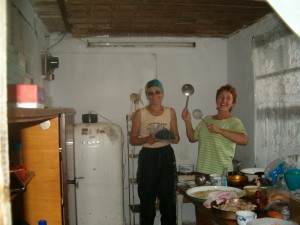
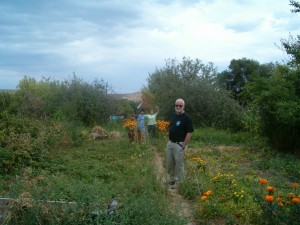
They served bishparmak (it really was the national dish of Kazakhstan, this was now the third time we’d had it). But just like American pot roast, it can vary tremendously with the chef. This production had both noodles and potatoes for its base and far more carrots and onions than we’d had previously. It was always served hot, but still, I was starting to enjoy eating it with my fingers.
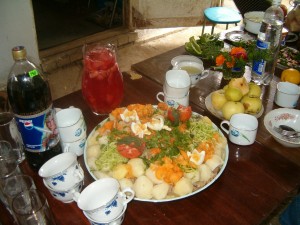
Dessert was a homemade cake with “You are Welcome” sweetly decorating the top. And watermelon.
The dacha belonged to Natasha, red-haired, denim-clad Natasha who had given me the flowers when we first arrived. Natasha was Russian by birth, as was her husband. She and her 11-year old daughter had enrolled in Kazakh dance classes. So, our after-dinner entertainment began with a dance performance by Natasha’s daughter
It continued as Woody brought out his guitar and sang some American folk tunes. My contribution to the evening was teaching “spit the pit” — this quintessentially lowbrow American pastime — with the watermelon seeds.
But what I remember best was the after dinner walk we took to the nearby recreation park.
As Zamzagul took the lead, I fell into step in the rear with Tatiana, another of Woody’s new colleagues, while her high-school aged son Artoom went on ahead with Woody and the others.
Tatiana was a large, muscular woman. With her salt and pepper hair cropped shorter than most, she had an athletic look that I hadn’t seen before in Kazakhstan. Her English was excellent.
“Have you lived here all your life?” I began as we walked.
“Yes, I was born here. My father was sent here by Stalin.”
Her disclosure surprised me. It was unusual to find anyone who spoke of difficult subjects. Tatiana was the first and I was eager to hear more.
“How old were they?”
“My mother was thirty-five, my father a little older. She followed him.” She offered this history freely and seemed eager to talk. “She has never talked to me about it, so I do not know much about that time.”
From the way she said this, I surmised she was referring to the labor camps of the Stalin era, the gulags. Since I’d arrived in Kazakhstan almost four months earlier, no one had even hinted at this part of the country’s history, not even the locals on the Peace Corps staff. I asked to meet her mother.
“My mother is ninety-one now. She is old and fragile. She cannot hear well.”
“And your father?”
“He died some time ago, when I was young.”
At the time of our talk, I was reading Lenin’s Tomb by Washington Post reporter David Remnick, who used forays into Russian history to provide a broader context to the story of the fall of the Soviet Union. I was learning that the gulags worked both to provide the labor in the mines and to reduce the number of political dissidents in Russia.
Though I’d heard generally of Joseph Stalin’s “reign of terror,” much of what Remnick reported was new to me. And, as usual, I wanted to know more. Would Tatiana talk about the genocide, the collectivization of nomadic lands that resulted in mass starvation, the dilution of the Kazakh population? Or would hers be a different version, a non-Western, Soviet version perhaps?
“What do you think of Stalin moving so many people here?” I ventured.
“Artoom believes Stalin was a good man. He was taught in his school that what Stalin did to the people, moving so many of them, helped to win the Great Patriotic War.” This would not be the last time I’d hear World War II referred to this way.
“But I don’t agree,” she added. “I think he did much damage. Artoom was taught that having so many other nationalities here during the war helped to seed the land and keep it stable. He believes Kazakhstan would not exist today, if not for Stalin.”
She sounded sad. “Artoom believes the Germans would have won the Great Patriotic War, if not for Stalin. I do not like what he is taught in school, but I don’t argue with him about it.” Indeed, Tatiana had a special relationship with her son, then in his final year of high school. An intelligent and sensitive young man, I’d seen him holding his mother’s hand during dinner.
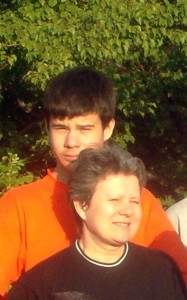
I wanted to ask about the “Virgin Lands Campaign” of the 1950s, a land-rush program in which Nikita Khrushchev enticed millions of Russians and Ukrainians to immigrate to Kazakhstan and set up collective wheat farms across the northern steppe. That ill-advised program resulted in the starvation death of some two million Kazakhs when the once fertile grassland steppe turned to dry topsoil and blew away.
So many topics I wanted to discuss with her, and so little time. She interrupted my ponderings.
“It is difficult to get a good education here. Next year we will move to Moscow so Artoom can get a good education at a university there.” I was very sorry to hear that for personal reasons. I enjoyed talking to Tatiana and hoped to see her again. Maybe I’d still get to meet her mother. “Life is different since independence,” she told me, again with some sadness.
“What do you mean?”
“We Russians are not wanted in Kazakhstan any more. It is hard to get a good job here.”
That Tatiana’s ethnicity would cause her trouble had not crossed my mind. I knew from our Peace Corps training that citizens of Kazakhstan are referred to as Kazakhstanis: a way for the various ethnic groups to remember they’re citizens of one country. I considered every citizen there to be Kazakhstani, as all American citizens are American, whether of Italian, Irish, African, or any other ancestry.
However, I’d yet to hear any citizen of Kazakhstan use the term “Kazakhstani.”
The national identity card that everyone over eighteen carried perpetuated their ethnic identities as Kazakh, Russian, German, Uighur, Tartar, Uzbek, or Azerbaijani. There were, at one count, one hundred twenty six distinct ethnic identities living in Kazakhstan. To add to my confusion, they called these ethnicities “nationalities.”
Tatiana, it seemed, still thought of herself as Russian, not Kazakhstani, though she was born and raised totally in Kazakhstan.
“But you work with Zamzagul and Natasha,” I responded, incredulous. “They do not want you?”
“No, not them specifically, but in general. Throughout the town, it is harder for a Russian to have a good life. Life is different now than before.”
Independence elevated Kazakhs to a position of power after 70 years of Soviet domination and, before that, 150 years of Russian tsarist rule. Now, with millions of Germans and Russians returning to their homelands and hundreds of thousands of oralmanders (diaspora Kazakhs) returning to Kazakhstan, Kazakhs were once again the majority. The President was Kazakh. And all who worked in government needed to be fluent in the Kazakh language.
Now I understood Natasha’s desire to learn Kazakh dancing, to fit in. Tatiana’s was a different response.
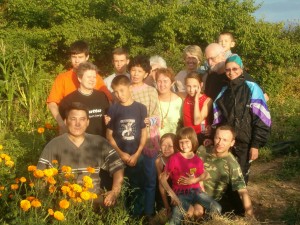
I hope you’ve enjoyed this little trip back to Kazakhstan with me. The Kazakhs are a proud and gracious people, eager to make any guest feel welcome. That’s what I remember most.
There’s no “make yourself at home” spoken in a Kazakh home. Instead, guests are treated — literally, I believe — as “gifts from God.” It made me think of how I generally entertain at home.
How about your? Are you a “make yourself at home” host, or more of the “gift from God” type? I’d love to hear from you.
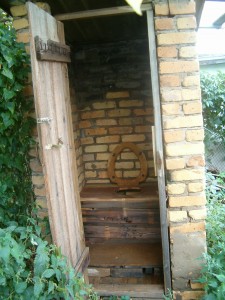
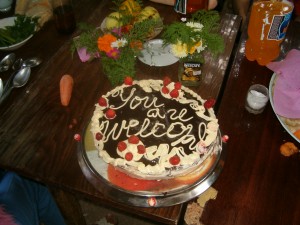
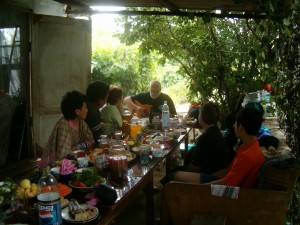
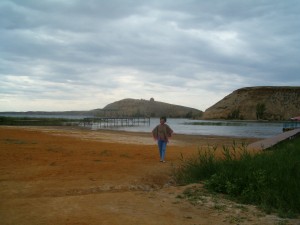
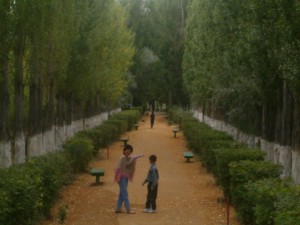
Marian Beaman
Kazakhstan is enough like Ukraine that I could imagine all the scenes you depict, except for the outhouse (we were mostly in cities). The main thing that stands out in both settings is the hospitality. In both cultures, people go out of their way to make one feel welcome. The frosting with script in English – Well, that takes the cake!
Janet
“Well, that takes the cake.” You are too funny. Thanks for dropping by.
Kelly Boyer Sagert
Have you thought about taking these deleted scenes and querying relevant magazines to get this story out and about?
Janet Givens
Hi Kelly, So good of you to visit. (insert wry smile here). Coming from you (a Writer’s Digest workshop leader, & how I first met you), I take your suggestion as a huge compliment. I had thought of putting the various Deleted Scenes together as an eBook, after the memoir comes out. But hadn’t thought of anything sooner. Thanks for the nudge.
Kelly Boyer Sagert
Well, you know the dreaded “p” word: platform. I’m thinking that, if you publish magazine articles from these excerpts, you’ll be adding to your writer platform as you’re going through the book publishing process.
KM Huber
I enjoy your “deleted scene” posts for they are vivid–I can see them–as well, I can hear each person’s uniqueness in the dialogue. It’s strong writing, Janet, as I have mentioned previously. For what it’s worth, I think the magazine idea (mentioned above) is an excellent one.
Karen
Janet Givens
Thanks Karen, I appreciate that very much. Particularly coming from you.